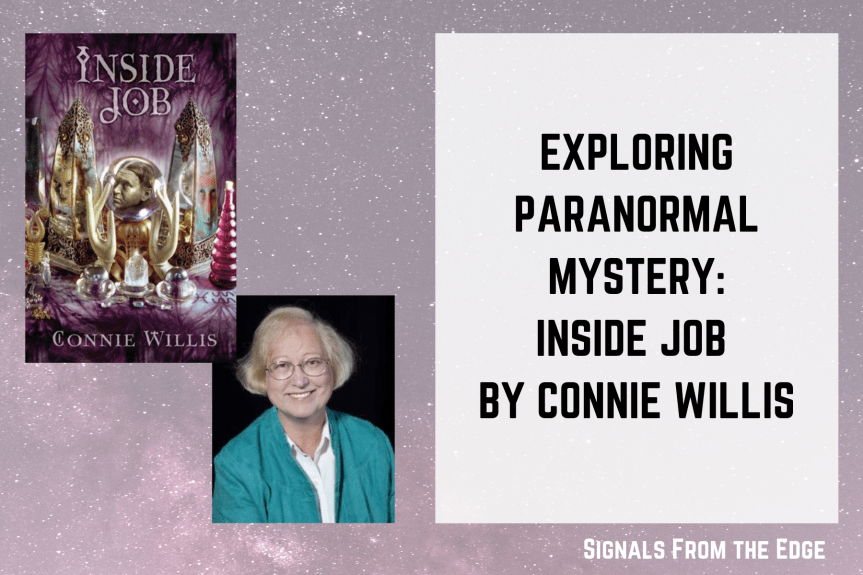Inside Job by Connie Willis was published in 2006 by Subterranean Press, and won the Hugo for Best Novella in the same year.
The novella focuses on a pair of professional debunkers who produce the magazine The Jaundiced Eye. The main character, Rob, is the editor of the magazine, and Kildy, his partner, is a disillusioned movie star with a penchant for skepticism.
They are working on a case surrounding psychic channeler Aurianna, only to discover that she has been channeling the spirit of H.L. Mencken, perhaps one of the biggest critics of psychics and creationists to have ever lived.
There’s a lot of back and forth about truth, skepticism, and what makes something ‘real’. Overall, the novella was a lot of fun to read, and it really shows how Connie Willis leverages her craft to great effect.
Connie Willis, Rule Breaker
The biggest strength of this novella is the creation of suspense. I am really quite intrigued how much I liked reading this book, considering almost the entire story occurred within the one-room office of The Jaundiced Eye.
In the beginning, Rob and Kildy go to Aurianna’s seminar, and at the very end, they go to another seminar, but for the 75 pages in between, they are firmly rooted in the microcosm of the office.
Now, this goes against what I was taught about writing scenes; parallelism is alright, and is sometimes necessary, like in the instance of the first and last seminar. But repeating scenes is not advised because it lulls the reader into a sense of familiarity, and could become boring or too stagnant.
Willis follows this pattern, where Rob is just ruminating in his office and then Kildy comes in with some new information, and then Aurianna storms in to accuse them of something. This scene happens at least three times.
But it doesn’t become boring, which is surprising. That’s because Willis employs a specific kind of writing style to make each scene different, and her creative dialogue whisks away any sense of repetition or boredom.
Connie Willis, Master of Dialogue
A lot of the book is constructed of dialogue, a back and forth between Rob and Kildy as they puzzle out the mystery or debate how they’ll go about questioning Aurianna.
To make the conversations more interesting, Willis utilizes Rob’s wellspring of psychic knowledge and history as a debunker to compliment the dialogue, and even, the narrative summary.
For example, on page 60, “‘Yes,’ I said, thinking of Randall Mars’s Lincoln and his ‘Four-score and seven….'” which draws on a previous comment from Rob, but just adds another layer of contextuality to the novella, creating an immersive effect.
The variation of the dialogue, interspersed with high context references, makes the story more interesting.
As the tale progresses, there are more references and information that relies on previous conversations.
This, I think, is a critical part of writing a mystery. As the story moves forward, the writer should be able to expect the reader to keep up with the contextuality of the narrative, thus allowing for a more complex ending than a beginning.
Coming Full Circle
Another subtle thing that I appreciated about Willis’ writing were the little hints she would drop early on that would come to completion in the end, making the reader recall their origin with nostalgia.
For example, within the first few pages, Rob mentions Charles Fred, another hack psychic he is trying to debunk. Then, at one point in the middle of the story, he mentions how he’d much rather be working on the Charles Fred case instead of spending time on a “third-rate channeler” like Aurianna.
Yet, as the story reaches completion, we see how Rob wrong in that little detail. So, there was a mini-completion of separate story arc in addition to the completion of the main story arc, which I appreciated.
In Conclusion
Inside Job was the first story I read by Connie Willis, but it definitely makes me want to keep reading her work. She takes the paranormal investigator genre, which is highly saturated, and creates something that stays within the confines of the genre, but is also wholly original.
I feel like she took a lot of inspiration from Arthur Conan Doyle’s Sherlock Holmes stories, where Holmes and Watson spend a lot of their time sitting in their armchairs at Baker Street. Those stories were never boring, but they lacked the high-octane action and violence that has become a large part of the paranormal investigator genre.
Overall, I give Inside Job a 9/10. It’s short, to the point, and full of character. I can see why it won a Hugo!

